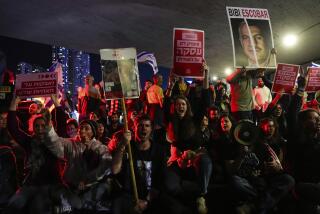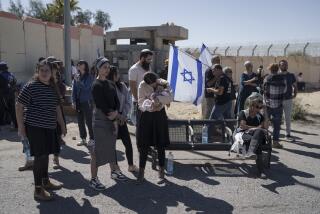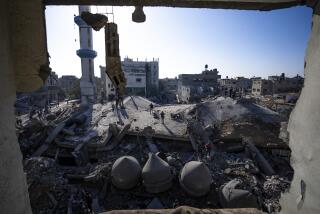Israel, Gaza militants clash anew before end of truce
Sirens wailed across Israel on Tuesday and explosions resounded in the Gaza Strip as attempts to prolong a fragile cease-fire dissolved in chaos, touching off a new round of fighting between Israel and the Palestinian militant group Hamas.
The outbreak of violence came hours before a temporary truce — the longest since the fighting erupted more than a month ago — expired at midnight, with no indication it would be extended.
The flare-up of hostilities began when rockets were fired into southern Israel on Tuesday afternoon, about eight hours before a temporary cease-fire was scheduled to end. The barrage intensified in the evening, including some projectiles aimed at the densely populated area of metropolitan Tel Aviv, Israeli officials said.
Palestinian militants fired dozens of rockets into Israel, and the Israeli military responded with a series of airstrikes in the coastal enclave, killing at least three people, including a 2-year-old girl and an elderly woman, according to Palestinian officials. Dozens of others were hurt, they said.
The Associated Press reported that Moussa Abu Marzouk, a senior Hamas leader, had said in Cairo that the dead included the wife and a child of Mohammed Deif, leader of the militant group’s military wing, the Izzidin al-Qassam Brigade, who has escaped numerous Israeli assassination attempts in the past. There was no immediate confirmation from Hamas leaders in Gaza.
Another Hamas official, Izzat Rishq, said indirect talks in the Egyptian capital had broken down, and blamed Israel. However, Azzam Ahmad, the spokesman for the Palestinian delegation, which includes factions other than Hamas, told reporters in Cairo that Palestinian envoys were leaving the Egyptian capital but would return if mediator Egypt asked.
In a sign of a reversion to war footing, public bomb shelters were reopened in Israel in a zone extending 50 miles from Gaza.
The future of any peace talks, which began after Israeli ground forces left Gaza nearly two weeks ago, was uncertain. Prime Minister Benjamin Netanyahu instructed the Israeli delegation to return from Cairo, where indirect negotiations between Israel and Hamas, which controls Gaza, have been taking place.
In the initial volley, rockets fell near the southern Israeli town of Beersheba and around Netivot, also in the Negev desert close to Gaza, the Israeli army announced shortly before declaring that a round of retaliatory airstrikes was underway. The rocket fire then grew in intensity and range throughout the evening.
Netanyahu spokesman Mark Regev declared in a tweet that the rocket strikes were a “grave and direct violation of the cease-fire to which Hamas committed itself.”
Hamas denied responsibility after the initial burst, but the Izzidin al-Qassam Brigade acknowledged responsibility for later volleys, declaring they were in response to the Israeli fire and citing in particular a strike on a home in the Sheik Radwan district outside Gaza City. Israeli news reports said the target was a rocket mastermind.
“This response is only the beginning,” the Hamas militia said in a statement. “The enemy … has opened the doors of hell on itself and will pay a heavy price.”
Gaza had been relatively calm for nearly two weeks, since Israel withdrew its ground forces and the two sides embarked on talks. More negotiations were held earlier Tuesday in Cairo but halted with the departure of the Israeli envoys.
The strikes were the first since Thursday, when rockets were launched in the early hours of a five-day cease-fire that otherwise largely held. That truce was extended late Monday by 24 hours and ended at midnight.
The talks in Cairo have centered on issues that include easing Israel’s long-standing blockade of Gaza and Israeli insistence that Hamas disarm or at least not use reconstruction of Gaza as a cover for rearming. But the parties have not yet been able to clinch a longer-term deal, not even one that puts off dealing with the most contentious issues.
Four weeks of fighting before the Israeli pullback left more than 2,000 Palestinians dead, most of them civilians, according to the United Nations. Sixty-four soldiers and three civilians were killed on the Israeli side.
Special correspondent Sobelman reported from Jerusalem and staff writer King from Istanbul.Follow news out of the Middle East with @laurakinglat on Twitter
More to Read
Start your day right
Sign up for Essential California for news, features and recommendations from the L.A. Times and beyond in your inbox six days a week.
You may occasionally receive promotional content from the Los Angeles Times.






